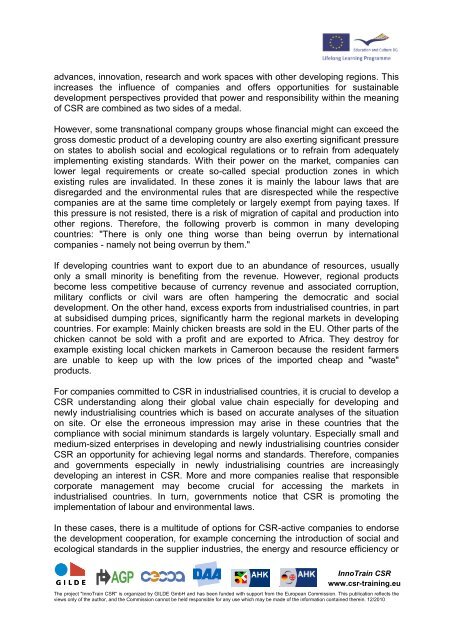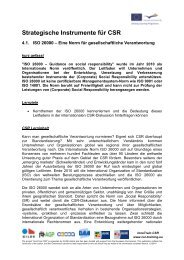What is Corporate Social Responsibility? - InnoTrain CSR
What is Corporate Social Responsibility? - InnoTrain CSR
What is Corporate Social Responsibility? - InnoTrain CSR
Create successful ePaper yourself
Turn your PDF publications into a flip-book with our unique Google optimized e-Paper software.
advances, innovation, research and work spaces with other developing regions. Th<strong>is</strong><br />
increases the influence of companies and offers opportunities for sustainable<br />
development perspectives provided that power and responsibility within the meaning<br />
of <strong>CSR</strong> are combined as two sides of a medal.<br />
However, some transnational company groups whose financial might can exceed the<br />
gross domestic product of a developing country are also exerting significant pressure<br />
on states to abol<strong>is</strong>h social and ecological regulations or to refrain from adequately<br />
implementing ex<strong>is</strong>ting standards. With their power on the market, companies can<br />
lower legal requirements or create so-called special production zones in which<br />
ex<strong>is</strong>ting rules are invalidated. In these zones it <strong>is</strong> mainly the labour laws that are<br />
d<strong>is</strong>regarded and the environmental rules that are d<strong>is</strong>respected while the respective<br />
companies are at the same time completely or largely exempt from paying taxes. If<br />
th<strong>is</strong> pressure <strong>is</strong> not res<strong>is</strong>ted, there <strong>is</strong> a r<strong>is</strong>k of migration of capital and production into<br />
other regions. Therefore, the following proverb <strong>is</strong> common in many developing<br />
countries: "There <strong>is</strong> only one thing worse than being overrun by international<br />
companies - namely not being overrun by them."<br />
If developing countries want to export due to an abundance of resources, usually<br />
only a small minority <strong>is</strong> benefiting from the revenue. However, regional products<br />
become less competitive because of currency revenue and associated corruption,<br />
military conflicts or civil wars are often hampering the democratic and social<br />
development. On the other hand, excess exports from industrial<strong>is</strong>ed countries, in part<br />
at subsid<strong>is</strong>ed dumping prices, significantly harm the regional markets in developing<br />
countries. For example: Mainly chicken breasts are sold in the EU. Other parts of the<br />
chicken cannot be sold with a profit and are exported to Africa. They destroy for<br />
example ex<strong>is</strong>ting local chicken markets in Cameroon because the resident farmers<br />
are unable to keep up with the low prices of the imported cheap and "waste"<br />
products.<br />
For companies committed to <strong>CSR</strong> in industrial<strong>is</strong>ed countries, it <strong>is</strong> crucial to develop a<br />
<strong>CSR</strong> understanding along their global value chain especially for developing and<br />
newly industrial<strong>is</strong>ing countries which <strong>is</strong> based on accurate analyses of the situation<br />
on site. Or else the erroneous impression may ar<strong>is</strong>e in these countries that the<br />
compliance with social minimum standards <strong>is</strong> largely voluntary. Especially small and<br />
medium-sized enterpr<strong>is</strong>es in developing and newly industrial<strong>is</strong>ing countries consider<br />
<strong>CSR</strong> an opportunity for achieving legal norms and standards. Therefore, companies<br />
and governments especially in newly industrial<strong>is</strong>ing countries are increasingly<br />
developing an interest in <strong>CSR</strong>. More and more companies real<strong>is</strong>e that responsible<br />
corporate management may become crucial for accessing the markets in<br />
industrial<strong>is</strong>ed countries. In turn, governments notice that <strong>CSR</strong> <strong>is</strong> promoting the<br />
implementation of labour and environmental laws.<br />
In these cases, there <strong>is</strong> a multitude of options for <strong>CSR</strong>-active companies to endorse<br />
the development cooperation, for example concerning the introduction of social and<br />
ecological standards in the supplier industries, the energy and resource efficiency or<br />
The project "<strong>InnoTrain</strong> <strong>CSR</strong>" <strong>is</strong> organized by GILDE GmbH and has been funded with support from the European Comm<strong>is</strong>sion. Th<strong>is</strong> publication reflects the<br />
views only of the author, and the Comm<strong>is</strong>sion cannot be held responsible for any use which may be made of the information contained therein. 12/2010<br />
,<br />
<strong>InnoTrain</strong> <strong>CSR</strong><br />
www.csr-training.eu





